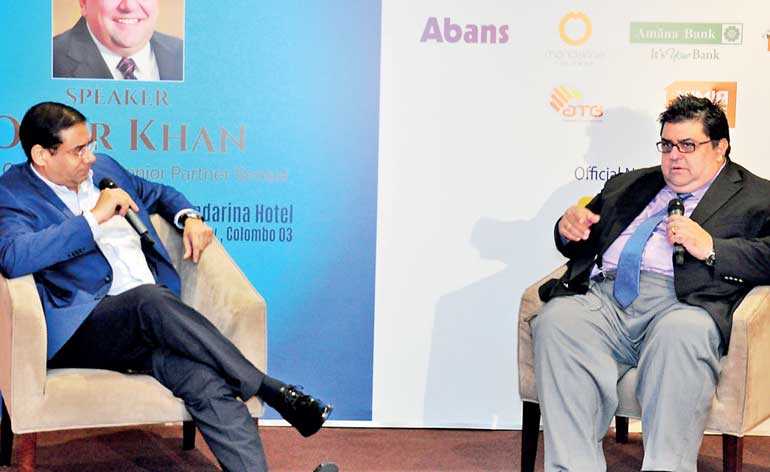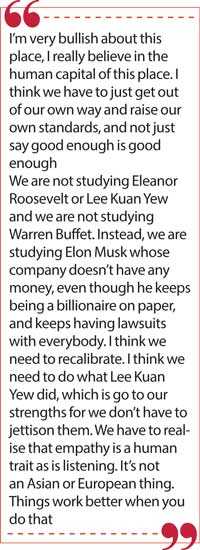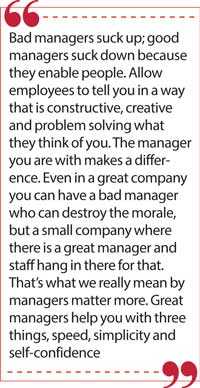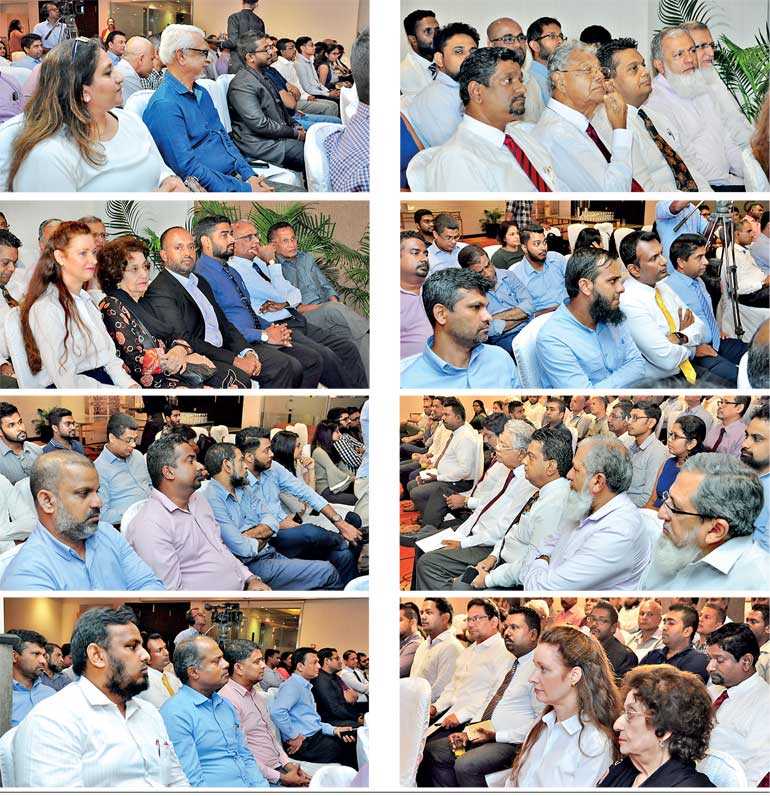Friday Feb 27, 2026
Friday Feb 27, 2026
Tuesday, 14 January 2020 00:00 - - {{hitsCtrl.values.hits}}

By Darshana Abayasingha
“Never ever as a leader position yourself as a barrier to possibility, you are supposed to be an architect to possibility. As a national leader, as a manager, as a parent… outside is Colombo outside is Sri Lanka; go be part of its renewal. If you decide you are going to be a first world country no political leader can stop you, no one can stop you. But, if you decide third world means third rate forever, no one can help you. Just go be architects,” avers renowned global consultant, Omar Khan.
The globally acclaimed speaker was in Sri Lanka recently to address a forum on ‘Managers Matter More Than Companies’, hosted by the Sri Lanka Retailers Association, the International Chamber of Commerce, myBIZ Sensei International and Daily FT.
Taking questions following his presentation, Omar Khan said that Sri Lanka has numerous opportunities to do something unprecedented to take on the world market, but he worries it will instead try to take the ‘Dubai route’ and have 35 shopping malls, 50 residential plazas and many more. “Who the hell is going to occupy them? Build the economy instead. The idea of build it and eventually they will come – that’s one thing if you have someone else paying your bills like Abu Dhabi. Even then, most of Dubai now is still a construction site,” he says. Whilst taking on only some aspects of the Dubai model, Khan hopes that Sri Lanka will follow the Singapore route of becoming a real service hub, alongside a centre for  technology development and education. He also notes that whilst he believes in the potential of tourism in Sri Lanka, the country cannot envisage its whole economy to be piloted ahead by tourism. “We do need tourists back, and we need to do better than we are now. But right now, we’ve printed t-shirts with a 19-point plan that no one can understand. We need speed, simplicity and self-confidence. Get the tourists back and the right tourists,” he says.
technology development and education. He also notes that whilst he believes in the potential of tourism in Sri Lanka, the country cannot envisage its whole economy to be piloted ahead by tourism. “We do need tourists back, and we need to do better than we are now. But right now, we’ve printed t-shirts with a 19-point plan that no one can understand. We need speed, simplicity and self-confidence. Get the tourists back and the right tourists,” he says.
Khan stresses the need to enhance services in banking, IT and education sectors and for Sri Lanka to become more entrepreneur-friendly. He notes Sri Lanka is ranked 71st in the human capital index whereas India, Bangladesh and Pakistan are at around 170, 120 and 150 respectively. After all that Sri Lanka has gone through, Sri Lanka still has great people, consumers and companies of great calibre, and people still willing to invest – capitalise on them. “I’m very bullish about this place, I really believe in the human capital of this place. I think we have to just get out of our own way and raise our own standards, and not just say good enough is good enough.”
Omar Khan is a renowned global consultant of Pakistani origin born in Egypt, and has lived in many parts of the world – including Sri Lanka – and studied at University College, Oxford, before proceeding to Stanford Law School. An author to a number of leading books, he is an innovator in transformational learning in the US and globally, and is the founder of Sensei International a global leadership development and consulting firm serving some of the biggest names across the globe.
“Nothing is forever. In the 1980s Pakistan was richer than China, India and Bangladesh. We are a few good decisions away from irrelevance to greatness. Lee Kuan Yew after producing a first-world nation said ‘Singapore has gone as far as discipline will take us, we now need to learn to be cool.’ Managers matter more, and that’s for national managers as well,” Khan remarks during the forum.
During the discussion, Srilal Miththapala asked Khan what he felt of Sri Lankan or Asian managers, as we tend to have a ‘live and let live’ style, and if he believed this was disadvantageous to us?
Go to our strengths
In response, Khan points out that statistically this may be so, but this could also be because we tend to fall into what he calls ‘Americansim or Britishism’ of things – following an alpha male and a lot of chest thumping. “We are not studying Eleanor Roosevelt or Lee Kuan Yew and we are not studying Warren Buffet. Instead, we are studying Elon Musk whose company doesn’t have any money, even though he keeps being a billionaire on paper, and keeps having lawsuits with everybody. I think we need to recalibrate. I think we need to do what Lee Kuan Yew did, which is go to our strengths for we don’t have to jettison them. We have to realise that empathy is a human trait as is listening. It’s not an Asian or European thing. Things work better when you do that,” he opines.
He also cautions that millennials are causing a lot of problems all over the world because they have a sense of entitlement, and the danger therein is that the old guard would choose to be reactive as opposed to finding a way to become mentors. It’s best to harness the energy of the new generation, but within the safety of some ‘guard rails’ Khan says.
The discussion was hosted by Chairman of the International Chamber of Commerce, Dinesh Weerakkody, who asked Khan to explain why Google CEO Sundar Pichai, said leadership is more important than leaders, and Khan aptly drew reference to the British football team in his explanation – they have great players but they never win. “Talent matters, but leadership or applying of that capability matters much more. There are people who feel – controversial as it may be – that Obama was a great leader, who did not necessarily show great leadership. What I mean by that is for instance right after the economic meltdown, all the people in his economic council that he invited were ex-bankers who had led to that meltdown. So, he had a chance to really drain the swamp, but…” he states.
Nurture the roots and break the chains
As leaders, your job as managers is to nurture the roots and break the chains, Khan says, and to know what are roots and what are the chains. He points out that people spend far too much time on today than tomorrow. One of the excuses given for not changing is that ‘we have always done it that way’. Leaders have to help teams decide what are the chains that are holding us back that we need to break, and what are the roots that we need to protect at all costs and we have to nurture. That’s a tough leadership call, and sometimes chains pose as roots. 
Micro management doesn’t work for anybody, he adds, you either have vision or you have supervision. Some managers then try to go from direction to delegation without coaching, which is a disaster. Micro management is a way of limiting growth, the only way out of it is to take the development ladder and be willing to coach, support and delegate. Khan was also posed the question on managing succession, and he was quick to point out that issues arise because some leaders don’t coach and get off the hierarchical totem pole; don’t delegate tasks, don’t empower people and allow them to do controlled experiments. When leaders don’t do that then they never get a chance to see until it is too late. The answer is identifying the influential, have them lead projects and use the projects as leadership labs to pick your shining stars.
“Bad managers suck up; good managers suck down because they enable people. Allow employees to tell you in a way that is constructive, creative and problem solving what they think of you. The manager you are with makes a difference. Even in a great company you can have a bad manager who can destroy the morale, but a small company where there is a great manager and staff hang in there for that. That’s what we really mean by managers matter more. Great managers help you with three things, speed, simplicity and self-confidence.”
Good managers help people speed up a little bit and the metabolism of your action taking, he says. Simplicity is having simple strategies that everyone can comprehend alongside the priorities they should be working on. Often the senior team thinks the junior team is working on one thing and the juniors think the expectation is different. It is also imperative to build the relevant infrastructure and training for people to deliver; they cannot do so without them.
“We were going to a meeting at the Shangri-La and of course to get in requires a major feat; storming the beaches of Normandy was easier going through the mall and all that. After getting through the snaking traffic, we pull up to the residence at Galle Face… the guy pops out sees our car and runs the other way. You are in the service business; run towards me don’t run away. At that moment, all the advertising the real estate had come down to a guy who could not tell us where to stop our car to get into his building. This is why bad management can undermine great ideas; it’s in the execution.”
Who executes it better
“It all comes down to who executes it better. You and your competitors probably have 80% of the same strategies unless you are in a niche, or you have a special resourcing ability which no one else does. If your strategy is smart, it can be copied. So, your teams have to be a source of competitive advantage. That’s why managers matter. But you have to build the infrastructure so they are empowered to perform, so your managers are not always just putting out fires. If so, they are taking you to mediocrity. The best ideas come from teams that display generosity, curiosity for multiple ideas, emotional intelligence, safety and a culture with no bullying.”
Speaking on technology, Omar Khan avers that everything that can be automated will be automated and it’s already happening. But it can also produce bad experiences because it’s generic. Therefore, we have to find the stuff that cannot be automated, as high-tech will make high-touch more important. If not, that too will become automated.
“All IT does is it helps you not communicate better. I really think you should not become the tools of your tools. I believe that everything is not a human skill, and everything where IT can make our decisions faster yes, we should automate. But we must never relinquish the ability to decide where it matters and how we are going to measure success or failure,” he states.
Referring to a number of examples from companies he has worked with globally, Khan pointed to Johnson and Johnson who did something he thinks half of Sri Lanka should do. The vision challenge. It was a manager who did it, and it was not a group-wide initiative. He had called customers and stakeholders, and before commencing the company’s business planning process had presented its vision to them and enquired if they felt whether it’s real or not. “At round tables you will have a combination of stakeholders and shareholders and brainstorm what we can do to bridge that gap. The next year we are going to call them back and they can tell us if that was rubbish or not. Every company I say this to say ‘wow what a wonderful idea’, but virtually nobody else did it. There’s never a right time or wrong time to do it. The manager who did it, became a positive deviant within J&J. His mantra was ‘It’s all good news no matter what they say, as long we listen to it and do something with it’.”
“One of the world’s largest tobacco companies could not get Asians beyond the glass ceiling. One manager in Asia Pacific said I want my Asian leaders to be promotable, and what he wanted to figure out was what his global bosses wanted to see from Asians, that would allow them to be promoted. If you look at Americans, it seems like that they are open communicators. But if you look at it really, they are no more open than anybody else, but they just talk more. So, what happens is that those bosses in the US, UK and elsewhere were seeing Asian leaders who don’t speak as much and decided that they were different, negligent and with no ideas and nothing to say. This was total rubbish. They are just not used to saying it in the way western society would say it. That one manager took the initiative and created a coaching program that engaged the Asian leaders with the top management and then there was a significant change.”
Omar Khan advises to always start by giving people an A. Give them an A and tell them to live into it. Coach people as if they are already an A and invite them to stay there. Better comes before cheaper and revenue comes before costs. Manage for actual value not for activity, and radically focus on competitive differentiation.
The three things people need to see at workplaces are ‘do I have what I need to do a great job, do I have the support I need to do it’, then the second question is if my workplace is a site of valued relationships, do I care about the people there and do I feel cared for? Number three is can I grow here, is there a future? The biggest thing that is missing often is number two.
Pix by Sameera Wijesinghe
